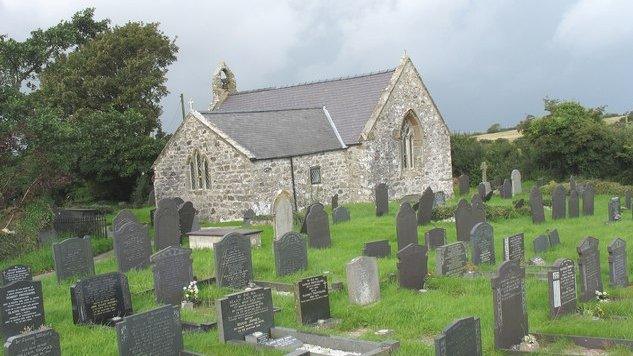Burial space in England 'could run out in 20 years'
- Published
- comments
The BBC's John Maguire visits a cemetery which is expanding for a second time
Almost half of England's cemeteries could run out of space within the next 20 years, a BBC survey suggests.
And a quarter of 358 local authorities responding to the BBC said they would have no more room for burials within a decade.
Cemetery experts warned of a looming "crisis", while managers called for a change in law to allow graves that are more than 75-years-old to be reused.
The Ministry of Justice (MoJ) said the issue was "under constant review".
BBC Local Radio approached 699 local authorities - 358 of which responded.
Many of the councils surveyed, including those in Gosport, Mole Valley, Crawley and Rother, said they had five years or less before they ran out of room.
Other areas - such as Tandridge district council in the South East - said they had already run out of space.
Some 44% said they had 20 years or less before burial space ran out.
About 74% of people who died in 2012 in the UK were cremated, but the cremation rates have levelled off - and there is still a demand for full burial and burial of ashes.
'Critical situation'
Although local authorities in larger areas such as Sheffield and Oxford expressed concern about dwindling cemetery space, some of the worst-hit areas were small rural councils.
Among them was the town of Bicester in Oxfordshire, which is due to double in size over the next 10 years with the development of 12,000 houses.
Bicester's cemetery manager Chris Johnson said: "The situation is critical now. We're getting to two years of burials remaining so we are desperate to find other means - other land for a new cemetery ground".
He said officials faced having to encroach on a nearby sports field to make room.
Elsewhere in the area, cemeteries have had to dig up their car parks and paths to cope with demand.
The BBC's religious affairs correspondent Robert Pigott said pressure on cemetery space meant people faced having to buy plots away from their home towns and families.
Bereaved relatives in Tandridge in Surrey have had problems with burial space for a long time.
Peter Wyre, from Caterham, lost his wife Susan nearly three years ago and was initially told he would not be able to bury her in the local graveyard.
Speaking to the BBC, he said he had been devastated by the news: "I was gutted, absolutely distraught. I mean if I wasn't upset already I was completely on the floor at that point. Just pure desperation because I knew that that's what she wanted."
However, he was able to bury his wife locally in the end: "They clearly understood that I was upset. And right on the 11th hour of Christmas Eve I had a call from the undertakers to say, 'look, we've called in a favour and spoken to various individuals and we have a place.'"
No decisions
Dr Julie Rugg, of the University of York's cemetery research unit, said the situation was "desperate" and called on the government to intervene.
She said the findings of the survey suggested "for the first time how desperate the problem is right across the country".
"It's not just a London or a big town problem. Even small parish councils are wondering how they are going to cope when land runs out," she said.
"I don't know how much more evidence there needs to be on the table before the Ministry of Justice appreciates that this is a crisis."
The MoJ is responsible for burial law. Local authorities are not legally bound to carry out burials but they are required to dispose of the dead.
In response to the findings, a spokesman for the MoJ said: "Any changes in the way in which graves and cemeteries might be managed need to be considered carefully and sensitively.
"We keep this area under constant review and no decisions have yet been taken."
Grave re-use
However, some have called for a change in grave use policy.
Tim Morris, from the Institute of Cemetery and Crematoria Management, said: "Money needed to build new cemeteries could be saved, and spent on the living, through the re-use of graves," he said.
He said such a move would involve lifting out remains from graves that are more than 75-years-old, burying them deeper in the same grave and then re-using the space on top.
A 2007 law permits this in London cemeteries but does not yet apply to the rest of England.
The City of London Cemetery, which is run by the City of London Corporation, is the only cemetery preparing to "lift and deepen".
Gary Burks, superintendent of the cemetery, said: "I believe that is achievable and acceptable. And I feel that it's appropriate for the world we live in.
- Published26 January 2011
- Published23 April 2013

- Published29 November 2010
- Published5 April 2011
- Published12 June 2013

- Published10 July 2013
